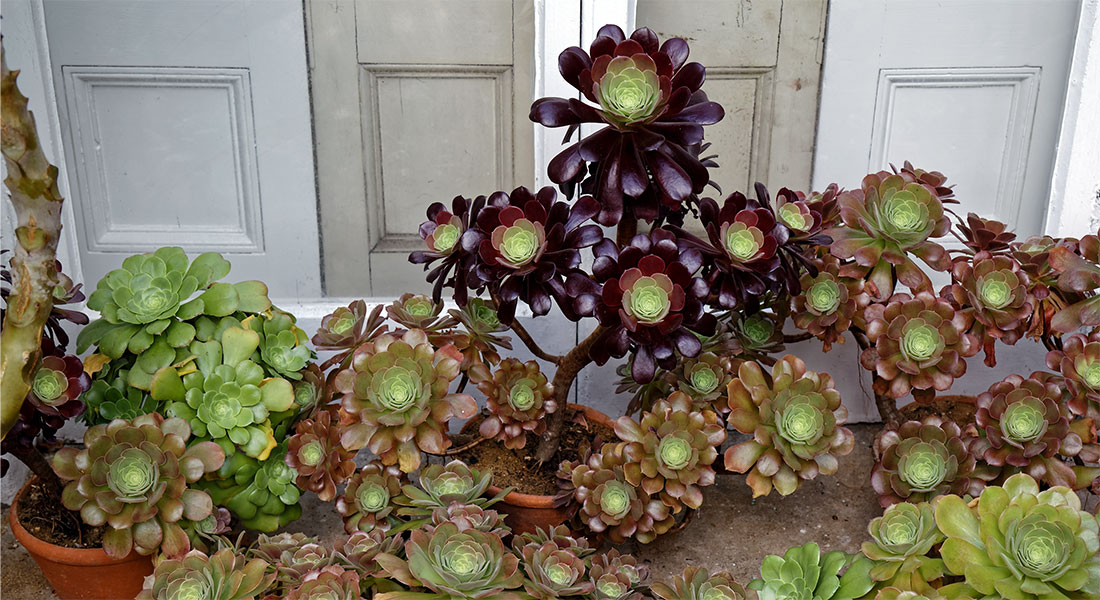Master Class: Ways of Making and Knowing in Plant Humanities: Cultivating Understanding in Visual Cultures of Vegetation

Aeonium arboreum 'Atropurpureum' and 'Zwartkop' ('Schwartzkopf'), in the conservatory attached to the south face of the Grade II listed c.1819 Myddelton House, in a garden developed by Edward Augustus Bowles (1865 – 1954), botanist, horticulturalist and Vice President of the Royal Horticultural Society: Bulls Cross, Enfield, London, England. Credit: Acabashi. Wikimedia Commons CC-BY-SA
Plant matter is unruly, prodigious, generous, instrumentalized, and critically essential to humanity and other animals. It is also critically endangered by climate change. In this time of ecological upheaval and crisis, the rising field of plant humanities has value and urgency. Plant humanities is a relatively new area of research that has emerged in the past decade to address human-vegetal interactions, their meanings, epistemes, effects and affects. The call for investigations of both the pasts and potential futures of human-plant relations has forged new research methods for identifying and examining overlooked or underexplored records of human-plant interactions held in established collecting institutions as diverse as herbaria, botanical gardens, art museums, and colonial archives, but also extending to areas as varied as visual studies, comparative literature, and the 'practices of everyday life'.
Intersecting different interdisciplinary practice-based methods such as art history, artistic research, collections-based research, curation, and environmental studies, this Master Class aims to strengthen the participants' understanding of the wide field of plant humanities in the context of visual culture. How can we get to 'plant thinking' or 'vegetal philosophy' through excavating and charting historical traces left in records such as paintings and other artworks, herbarium sheets, colonial and agricultural planting records, advice to householders, and more?
PASS - Center for Practice-based Art Studies (PASS) at the University of Copenhagen is collaborating with the Environmental Media and Aesthetics research centre at Aarhus University to produce this Master Class. It is organised by Associate Professor Martha Fleming, who is concurrently Principal Investigator of Field/Work in the Archive: Herbaria as Sites of Cultural Exchange at the Natural History Museum Denmark, and Associate Professor Anette Vandsø, who is Principal Investigator of Skjulte Plantehistorier; kunsten at opdage interartslige forviklinger i det grønne danske hjem. Both will be teaching on the Master Class.
Taking place in significant and diverse locations around Copenhagen where art and plants intersect, including Ordrupgaard, Den Hirschsprungske Samling, Statens Naturhistoriske Museum, Botaniske Have København, and Landbohøjskole, the course will unfurl over the 'landscape' of plant knowledge in the visual field in a Scandinavian context.
Master Class participants will benefit from knowledge shared by authoritative international and interdisciplinary speakers at the two-day conference, and guided tours of gardens and galleries. The final intensive day of the course itself will give six participants an opportunity to present, discuss and receive feedback on their plant-related practice-based research from fellow early career researchers as well as from four of the conference's expert speakers across a range of disciplines from art history and history of science through to aesthetics, media studies and colonial history.
Registration
Read more and apply for the course.
Deadline for application: 2 November 2025.
Course fee: 0.00 DKK if you are selected for participation.
